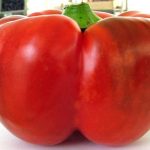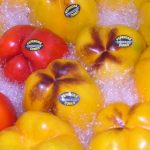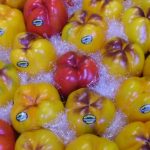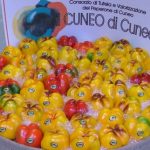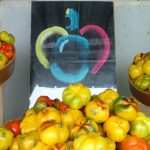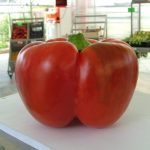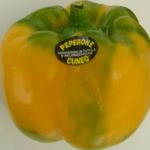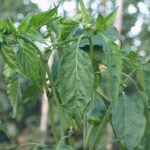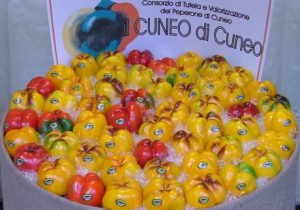
Name
Cuneo Pepper
Seal of quality
Prodotto Agroalimentare Tradizionale (PAT) / Typical food-farming product.
Description
The Cuneo pepper responds to the morphological characteristics referable to the Capsicum annum var. Grossum Sent variety, better known as “quadrato di Cuneo”. The peculiar characteristics of these peppers, which make them unique, are their shape and the texture of the pulp which is hard, fleshy, crispy, and with a thickness of approx. 10 mm . The berry is yellow or red, characterised by 3 or 4 lobes terminating in the pointed distal part: at this point where the lobes join together, the pericarp generally presents brownish bronzing known as “baffi” (moustache).
Nutritional characteristics
Follows the nutritional characteristics of Peperone.
| Peperone Cuneo | ||
|---|---|---|
| Protein | g/100g | 1.17 |
| fat | g/100g | 3.17 |
| Vit A | u.i./100g | 690 |
| Vit B | mg/100g | 0.14 |
| Vit C | mg/100g | 106 |
| calcium | mg/100g | 7 |
| Phosphor | mg/100g | 25 |
| iron | mg/100g | 0.8 |
| calories | kcal | 14 |
Area of production
The area in which the Cuneo pepper is produced is identified within the entire area of the province of Cuneo, with the exception of the mountain regions with altitudes exceeding 680 metres above sea level.
History
The first historical reference in our possession, linked with this vegetable, dates back to 1915 when it was mentioned among the commercialised products in the “Bollettino Prezzi Mercati Città di Cuneo”.
It would seem that the Cuneo variety comes from a natural cross between an old native variety tending to produce medium-small berries the shape of a tomato, and the huge square shape variety of Naples and Nocera. This cross, characterised by high genetic instability, was initially grown in the area north of Cuneo (especially in the Ronchi area). This is where horticulturists have given life to the CUNEO plant variety, later spreading it to bordering areas and other places in the province, in particular in the Braidese area.
A dry climate, sunny but not sultry days in summer, soil rich in organic substances, particularly permeable, are the characteristics that make the province of Cuneo an extremely favourable environment for the growth of this vegetable. The pepper has gone a long way since then and now it is grown in most of the flatland of the Granda, covering an area of 450 hectares .
In 2000, a group of producers from Turin set up the “Consorzio per la tutela e la valorizzazione del Peperone Cuneo” with the purpose of giving value to this vegetable of such long history in the Cuneo region.
